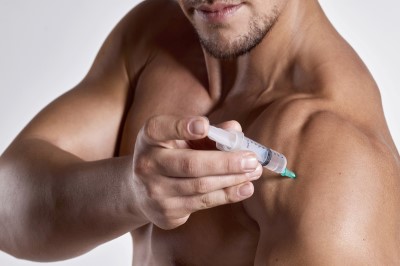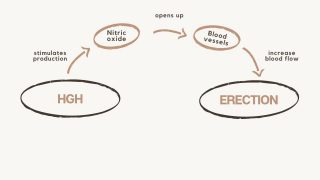There is a definite link between diabetes and erectile dysfunction (ED).
Diabetes has many negative impacts on a man’s quality of life, not the least of which is Erectile Dysfunction.
Men with diabetes have “high blood sugar,” which is the layman’s way of describing too much glucose in the blood. Cells need glucose for energy.
Diabetes is not a single condition or disease. It is a group of metabolic diseases characterized by increased levels of glucose or “sugar” in the blood. Insulin is the hormone that helps to “metabolize” sugar. This is why diabetes is referred to as a “metabolic condition.” A man with diabetes does not produce enough insulin, or the cells lose their ability to respond properly and “open up” in the presence of insulin. Either way, the result is too much glucose or sugar building up in the blood instead of getting into the cells where it is needed for energy.
That increased level of sugar in the blood has a number of debilitating effects, not the least of which is impotence or erectile dysfunction.
What is the Link Between Diabetes and ED?
 Men with diabetes often suffer from erectile dysfunction. This is unfortunate, not only because of the obvious impact on your love life, but many scientific studies have shown that a healthy and active sex life contributes to overall vitality and wellbeing, particularly in older men.
Men with diabetes often suffer from erectile dysfunction. This is unfortunate, not only because of the obvious impact on your love life, but many scientific studies have shown that a healthy and active sex life contributes to overall vitality and wellbeing, particularly in older men.
Researchers cannot categorically say that diabetes “causes” ED, but there are many health issues that come with diabetes, such as lack of nerve sensitivity and poor circulation, that definitely impact sexual performance and your ability to achieve or maintain an erection.
In addition, men with diabetes also often have what we call “comorbid conditions” – other conditions, such as obesity, heart disease, or high blood pressure – that also impact sexual performance and can cause ED.
What Are the Best Treatment Options Available for Men With ED Related to Diabetes?
As you probably know, the most widely used treatments for ED today are Viagra and similar drugs. The problem is most of these drugs – known as PDE5 inhibitors, are contraindicated for men with high blood pressure, heart disease, and diabetes, which means that one of the best treatments available for men with ED that is related to diabetes is hormone replacement therapy.
Two of a man’s most critical hormones, testosterone and human growth hormone, both decline as he ages. This age-related hormone decline results in a number of health issues, not the least of which is ED. Testosterone and HGH both play a vital role in your sex drive and your ability to get and maintain an erection.
Testosterone Replacement Therapy for ED
 Men, particularly men over 40 with diabetes as well as ED, almost always will also have low testosterone.
Men, particularly men over 40 with diabetes as well as ED, almost always will also have low testosterone.
Low testosterone is known to contribute to both ED and diabetes.
Testosterone replacement therapy has been shown to help alleviate erectile difficulties in men with low testosterone.
So, what is the link between low testosterone, diabetes, and ED? We know that all three conditions almost always happen together. We cannot definitely say that one causes the other, but they are all what doctors refer to as “comorbid.” This means that men with low testosterone tend to have diabetes, and we know that both diabetes and low testosterone can lead to ED. Furthermore, the kind of issues that can increase the risk of developing diabetes, such as obesity and cardiovascular disease, can also influence ED.
As you can see, all three of these conditions are very intimately related – so much so that testosterone therapy has been shown to be beneficial in relieving the symptoms of low testosterone, resolving diabetes, and improving sex drive as well as sexual performance.
Understand that testosterone therapy is not considered a standalone treatment for ED; however, most of our patients report that one of the very first things they notice within the first few weeks of testosterone replacement therapy is an increased ability to get and maintain an erection and an improved sex drive or libido.
HGH Therapy and Erectile Dysfunction
The other hormone that plays a major role in erectile function is HGH. And, like testosterone, your HGH level drops as you age and also impacts your ability to get and maintain an erection.
Furthermore, there is more of a direct relationship between HGH levels and the risk of developing diabetes. HGH has an influence on the level of glucose in your blood. Growth hormone is one of three hormones produced by your body that are designed to raise blood sugar levels. The other two are epinephrine and cortisol. In this way, HGH is instrumental in the whole process of sugar metabolism.
There is a strong link between growth hormone deficiency (GHD) and diabetes, even more so than the link between low testosterone and diabetes. HGH, along with insulin and IGF-1, is an important hormone in the process of metabolism. You have certainly heard the word “metabolism” and how it relates to diabetes, obesity, and cardiovascular disease. Basically, metabolism and “metabolic processes” are all involved in the way your body either burns the calories in the foods you eat into energy for your cells or stores it as fat.
When you have a low level of HGH, your metabolism slows, and you store more fat than you burn. This is why obesity is one of the main signs and health risks of having GHD. We know that being overweight is also a major contributing factor to the development of type 2 diabetes.
Increasing your risk of diabetes and causing obesity is only one way that low levels of HGH also contribute to ED and other sexual health issues. Like testosterone therapy, one of the first positive benefits patients on growth hormone therapy report is an increased sex drive and improved erectile function.
Why is this? What is the link between HGH and sexual health?
As people age, one of the first things they notice is a drop in the sex drive, or libido, and other sexual performance issues – in men, that usually means erectile dysfunction.
 The relationship between HGH and erectile function has a lot to do with its association with nitric oxide. HGH is needed for the production of nitric oxide and nitric oxide is essential for an erection. Most oral ED medications work by increasing nitric oxide.
The relationship between HGH and erectile function has a lot to do with its association with nitric oxide. HGH is needed for the production of nitric oxide and nitric oxide is essential for an erection. Most oral ED medications work by increasing nitric oxide.
Nitric oxide is fundamental to the process of getting an erection. Nitrous oxide is released upon sexual arousal. It is nitrous oxide that stimulates the blood vessels in the penis to open up and for the penis to become engorged with blood resulting in erection.
Researchers have found that visual or physical sexual stimulation not only increases nitric oxide in the blood vessels critical to getting and maintaining an erection, but HGH levels as well.
HGH is not given strictly as a treatment for ED. The researchers discovered this link between HGH, nitric oxide and erectile function when men who were being given HGH therapy for other issues such as loss of vitality and muscle wasting, reported an increased ability to obtain and maintain an erection.
HGH Supplements VS Injections
There is no such thing as over-the-counter HGH. You cannot buy genuine HGH without a doctor’s prescription. HGH supplements or so-called HGH boosters do not have the same benefits as authentic HGH injections, particularly as regards erectile dysfunction.
All the benefits of HGH for erectile difficulties and studies discussed on this page all have to do with HGH injections. There is little or no research that indicates that HGH supplements can help men with diabetes-related ED regain normal sexual function.
How Can You Lower Your Risk of Diabetes and ED Complications?
Now that we know there is a definite link between diabetes and ED, is there anything you can do that could possibly help prevent either condition? The answer to that is a resounding “yes.” Here are some steps you can and should take that could lower your risk of developing diabetes and diabetes-related erectile dysfunction.
 Lose some weight – Obesity is the greatest risk factor for developing type 2 diabetes.
Lose some weight – Obesity is the greatest risk factor for developing type 2 diabetes.- Exercise more – Getting more physically active will not only help you lose weight, but it also can lower blood sugar and help combat insulin resistance.
- Eat healthier – Eating certain foods can lower your risk of developing diabetes. Of course, you want to avoid high-fat, sugary foods. Add more veggies to your diet and fiber-rich foods.
- Reduce stress – Make efforts to reduce daily stress. Stress can cause you to overeat, which can lead to diabetes, but stress also can play havoc with your hormones, lowering your testosterone levels which, as we have seen, can also lead to diabetes and ED.
- Stop smoking – If you need another good reason to quit smoking, tobacco use has been linked to both an increased risk of developing diabetes as well as issues with ED, even in non-diabetic men.
FAQ
Is Erectile Dysfunction Due to Diabetes Reversible?
If your ED is indeed caused by your diabetes and you take efforts to get your diabetes under control along with making the lifestyle changes discussed on these pages, and possibly combine that all with hormone therapies as advised by your doctor, then, yes, your ED symptoms could be reversed.
How Long Does it Take for Diabetes to Cause Erectile Dysfunction?
Not all men with diabetes will absolutely develop ED. However, research suggests that about half of men who are diagnosed with type 2 diabetes will develop ED within five to 10 years of their diagnosis. If those men also have heart disease or other comorbid conditions such as high blood pressure, their odds of becoming impotent are even greater.
Can Erectile Dysfunction be a Symptom of Testicular Cancer?
There are far more common causes of ED than testicular cancer; however, it could be a reason for difficulty getting or maintaining an erection. Men with ED should be aware of the other signs that could indicate their ED is due to testicular cancer, such as a lump or swelling in either or both testicles or pain or discomfort in the scrotum.


 Lose some weight – Obesity is the greatest risk factor for developing type 2 diabetes.
Lose some weight – Obesity is the greatest risk factor for developing type 2 diabetes.